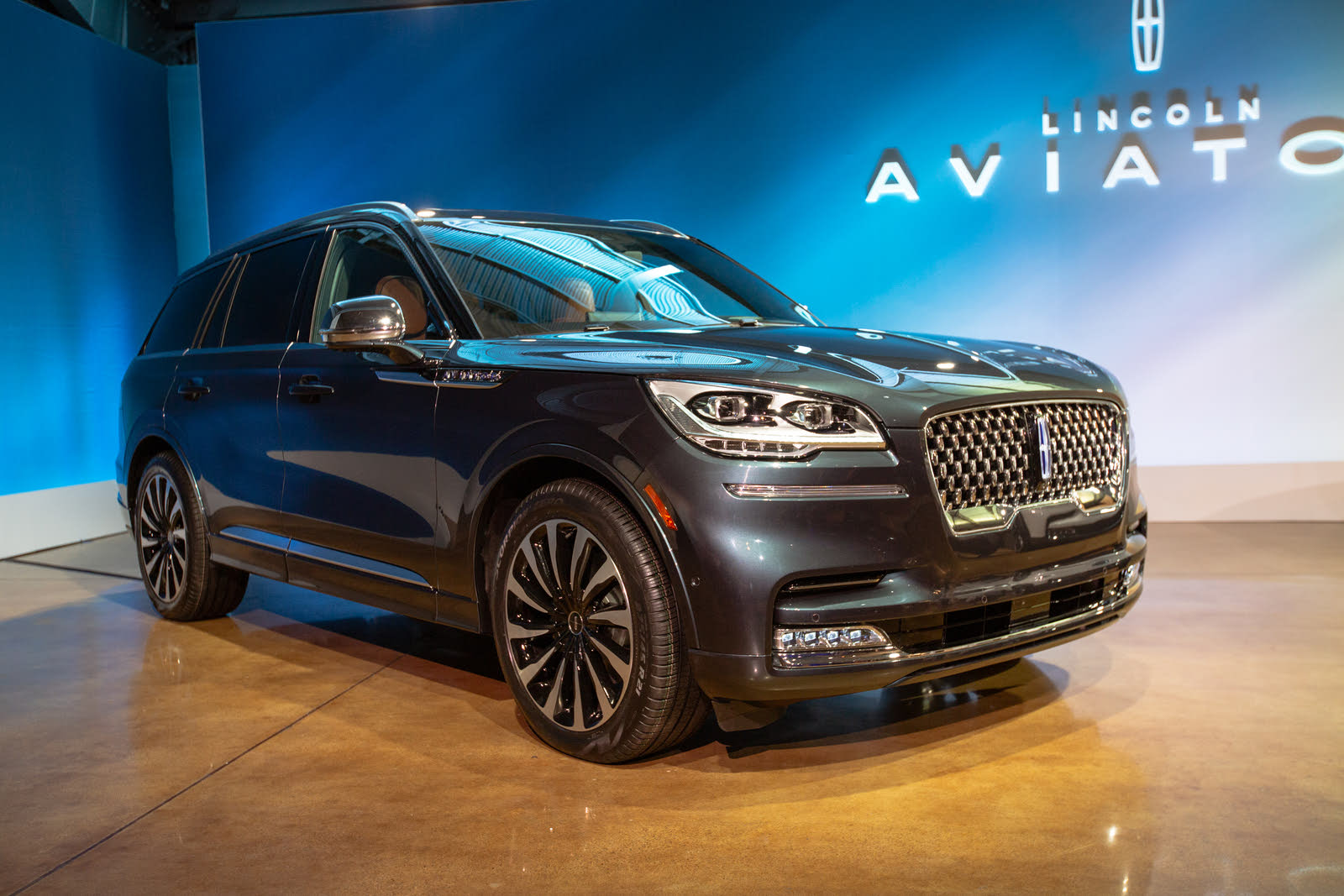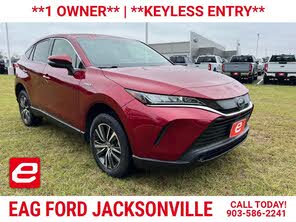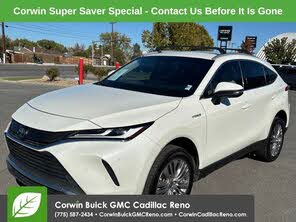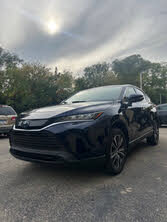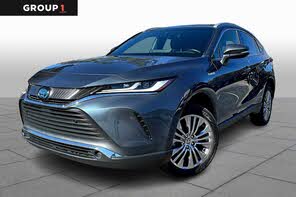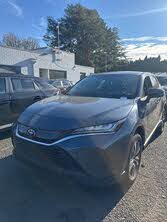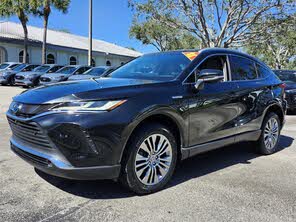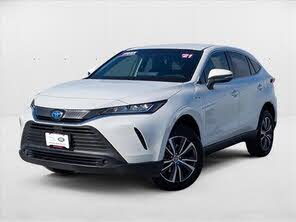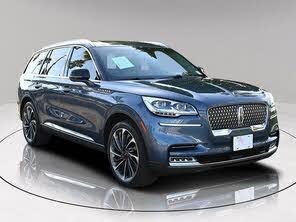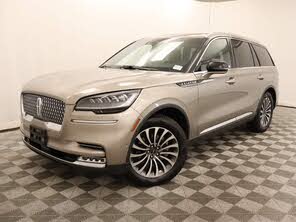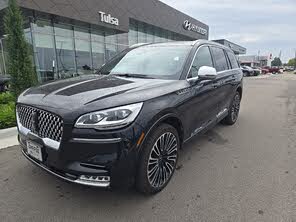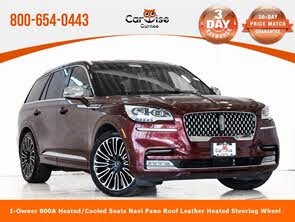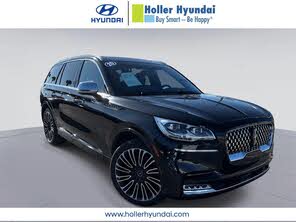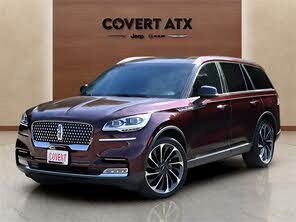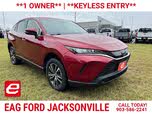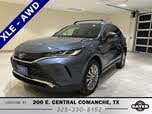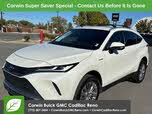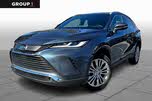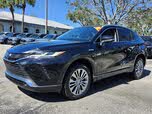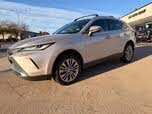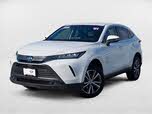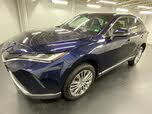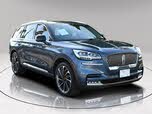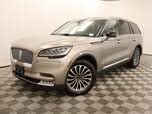2021 Toyota Venza vs 2020 Lincoln Aviator
Overview | |
MSRP$51,100 | MSRP$32,670 |
Listings591 | Listings481 |
Ratings & Reviews | |
User Reviews | User Reviews |
Expert reviews8.2 out of 10 | Expert reviews8.3 out of 10 |
Pros
Cons
| Pros
Cons
|
2020 Lincoln Aviator Reviews SummaryThe heyday for Lincoln was more than a half-century ago. Those postwar years of prosperity and optimism were the perfect time for cars like the Continental and others. They delivered comfort and luxury, wrapped in midcentury modern styling. Even as recently as the 1990s, Lincoln was still a popular brand, riding the SUV craze with its Navigator. But after the turn of the century, Lincoln lost its ability to create new designs and looked inward and backward. Sure, retro-themed cars like the redesigned Mustang, PT Cruiser, and Chevy HHR had turned some heads, but none of those came from luxury brands. The BMWs and Mercedes of the world were all looking forward and pushing the envelope for contemporary automotive design. Meanwhile, Lincoln offered the MKX, which was based on the Ford Edge and featured ’66 Continental styling. Neat in a vacuum, but off-base compared to the modern luxury market. This experimental phase with various retro looks coincided with the move to the MK-# alphabet-soup naming convention and big improvements in the Ford lineup, where top-end trims of the Fusion overlapped with an entry-level trim of the MKZ. The combination left Lincoln a confusing, anonymous afterthought in the modern luxury game. But Lincoln is finally ready to change all that. It has a new cohesive design language, its focus is once again on luxury, and the three-letter naming convention that never meant anything to anyone other than Lincoln marketers is gone. The brand led with the 2017 Continental and 2018 Navigator, which are each impressive in their own right. But the company's lineup is growing and now includes the all-new 2020 Lincoln Aviator. Named after a luxury variant of the 2002-2005 Ford Explorer, this new Aviator is also based on the contemporary Explorer platform, but it's a luxury vehicle in its own right. Much of the success of the Lincoln brand may hinge on this midsize, 3-row luxury SUV, so you need to consider its competition, such as the Audi Q7, Infiniti QX60, and all-new Cadillac XT6. Read on to learn if Lincoln’s take on luxury will stand out in a crowded competitive field. | |
2021 Toyota Venza Reviews SummaryAt first glance, the 2021 Toyota Venza looks more like a Lexus than a typical Toyota, which is fitting, because the Venza is anything but typical. The new Venza blends a new approach to in-car technology with fresh exterior and interior design. Like the Nissan Murano, Honda Passport, Ford Edge, and Chevrolet Blazer, the Venza is a two-row SUV meant to be more sophisticated than the family-friendly Nissan Rogue, Honda CR-V, Chevrolet Equinox, and Toyota RAV4. There is no three-row Venza option. It also comes only with a hybrid powertrain—for better or worse—something that its competition is lacking. All-wheel drive is also standard. That's also offered by the competition, but only as a costly upgrade. The Venza’s $32,470 starting price is slightly higher than the Murano and Blazer, but it comes with the traditionally-more-expensive hybrid powertrain. Is the hybrid worth shelling out a little more for? | |
Popular Features & Specs | |
Engine3.0L 400 hp V6 | Engine2.5L 219 hp I4 Hybrid |
Drive TrainRWD | Drive TrainAWD |
Seating Capacity7 | Seating Capacity5 |
EV Battery Capacity | EV Battery Capacity0.93 kWh |
MPG City18 | MPG City40 |
MPG Highway26 | MPG Highway37 |
Engine | |
Engine Name3.0L 400 hp V6 | Engine Name2.5L 219 hp I4 Hybrid |
DrivetrainRWD | DrivetrainAWD |
Fuel Economy | |
EV Battery Capacity | EV Battery Capacity0.93 kWh |
MPG City18 | MPG City40 |
MPG Highway26 | MPG Highway37 |
Interior | |
Seating Capacity7 | Seating Capacity5 |
Safety | |
Front Crash Overall5 | Front Crash Overall4 |
Side Crash Overall5 | Side Crash Overall5 |
Dimensions & Capacity | |
Cargo Space18.3 cu ft | Cargo Space28.8 cu ft |
Curb Weight4764 lbs | Curb Weight3847 lbs |
Height69.8 in | Height65.9 in |
Length199.3 in | Length186.6 in |
Width89.9 in | Width73.0 in |
Wheelbase119.1 in | Wheelbase105.9 in |
Maximum Payload | Maximum Payload900 lbs |
Number of doors4 | Number of doors4 |
Overview | ||
MSRP | $51,100 | $32,670 |
Listings | ||
Ratings & Reviews | ||
User reviews | ||
Expert reviews | 8.2 out of 10Read full review | 8.3 out of 10Read full review |
Pros & cons | Pros
Cons
| Pros
Cons
|
Summary | The heyday for Lincoln was more than a half-century ago. Those postwar years of prosperity and optimism were the perfect time for cars like the Continental and others. They delivered comfort and luxury, wrapped in midcentury modern styling. Even as recently as the 1990s, Lincoln was still a popular brand, riding the SUV craze with its Navigator. But after the turn of the century, Lincoln lost its ability to create new designs and looked inward and backward. Sure, retro-themed cars like the redesigned Mustang, PT Cruiser, and Chevy HHR had turned some heads, but none of those came from luxury brands. The BMWs and Mercedes of the world were all looking forward and pushing the envelope for contemporary automotive design. Meanwhile, Lincoln offered the MKX, which was based on the Ford Edge and featured ’66 Continental styling. Neat in a vacuum, but off-base compared to the modern luxury market. This experimental phase with various retro looks coincided with the move to the MK-# alphabet-soup naming convention and big improvements in the Ford lineup, where top-end trims of the Fusion overlapped with an entry-level trim of the MKZ. The combination left Lincoln a confusing, anonymous afterthought in the modern luxury game. But Lincoln is finally ready to change all that. It has a new cohesive design language, its focus is once again on luxury, and the three-letter naming convention that never meant anything to anyone other than Lincoln marketers is gone. The brand led with the 2017 Continental and 2018 Navigator, which are each impressive in their own right. But the company's lineup is growing and now includes the all-new 2020 Lincoln Aviator. Named after a luxury variant of the 2002-2005 Ford Explorer, this new Aviator is also based on the contemporary Explorer platform, but it's a luxury vehicle in its own right. Much of the success of the Lincoln brand may hinge on this midsize, 3-row luxury SUV, so you need to consider its competition, such as the Audi Q7, Infiniti QX60, and all-new Cadillac XT6. Read on to learn if Lincoln’s take on luxury will stand out in a crowded competitive field. | At first glance, the 2021 Toyota Venza looks more like a Lexus than a typical Toyota, which is fitting, because the Venza is anything but typical. The new Venza blends a new approach to in-car technology with fresh exterior and interior design. Like the Nissan Murano, Honda Passport, Ford Edge, and Chevrolet Blazer, the Venza is a two-row SUV meant to be more sophisticated than the family-friendly Nissan Rogue, Honda CR-V, Chevrolet Equinox, and Toyota RAV4. There is no three-row Venza option. It also comes only with a hybrid powertrain—for better or worse—something that its competition is lacking. All-wheel drive is also standard. That's also offered by the competition, but only as a costly upgrade. The Venza’s $32,470 starting price is slightly higher than the Murano and Blazer, but it comes with the traditionally-more-expensive hybrid powertrain. Is the hybrid worth shelling out a little more for? |
Video | ||
Popular Features & Specs | ||
Engine | 3.0L 400 hp V6 | 2.5L 219 hp I4 Hybrid |
Drive Train | RWD | AWD |
Seating Capacity | 7 | 5 |
EV Battery Capacity | 0.93 kWh | |
MPG City | 18 | 40 |
MPG Highway | 26 | 37 |
Engine | ||
Engine Name | 3.0L 400 hp V6 | 2.5L 219 hp I4 Hybrid |
Drivetrain | RWD | AWD |
Fuel Economy | ||
EV Battery Capacity | 0.93 kWh | |
MPG City | 18 | 40 |
MPG Highway | 26 | 37 |
Interior | ||
Seating Capacity | 7 | 5 |
Safety | ||
Front Crash Overall | 5 | 4 |
Side Crash Overall | 5 | 5 |
Dimensions & Capacity | ||
Cargo Space | 18.3 cu ft | 28.8 cu ft |
Curb Weight | 4764 lbs | 3847 lbs |
Height | 69.8 in | 65.9 in |
Length | 199.3 in | 186.6 in |
Width | 89.9 in | 73.0 in |
Wheelbase | 119.1 in | 105.9 in |
Maximum Payload | 900 lbs | |
Number of doors | 4 | 4 |
The 2020 Lincoln Aviator slotted below the Navigator and above the compact MKC and its replacement, the Lincoln Corsair, in the Lincoln lineup. The Aviator featured a unified design across Lincoln's sedans, crossovers, and SUVs, with handsome headlights and an upright chrome grille. Its roofline tapered, giving it an elongated look, and its low, wide beltline provided a boat-like appearance. Inside, the Aviator's cabin boasted a flowing design, soft-touch materials, and selective use of brightwork. The seats were both elegant and sturdy, with shifter buttons resembling piano keys. The front seats were incredibly comfortable, using soft-touch materials throughout, including plush leather on the dash, door panels, and sides of the center console. The Aviator also featured a massive panoramic moonroof and unique warning jingles recorded by the Detroit Symphony Orchestra. The lineup included five trims: Standard, Reserve, Grand Touring, Black Label, and Black Label Grand Touring, each offering various luxury features and options.
The 2021 Toyota Venza, five to six inches shorter than the RAV4 and about one inch closer to the ground, looked more like a Lexus, blurring the line between the brands. The Venza was available in three trim levels: LE, XLE, and Limited, with seven paint color options. Standard equipment included a dual chrome-tipped exhaust, LED headlights and taillights, automatic high beams, puddle lights, and 18-inch alloy wheels. The base LE model featured a wireless charging pad, 4.2-inch driver’s information display, leather-trimmed steering wheel, Bluetooth, dual-zone automatic climate control, fabric-trimmed seats, and an 8-inch infotainment touch screen. The XLE trim added black bumper garnishes, silver roof rails, 19-inch alloy wheels, LED projector headlights, and more. The top-tier Limited trim included a digital rearview mirror with Homelink, illuminated footwells, a backup camera washer, and a 12.3-inch infotainment screen, with the option to add the Star Gaze panoramic roof.











The 2020 Lincoln Aviator came standard with a twin-turbocharged 3.0-liter V6 engine, producing 400 horsepower and 415 pound-feet of torque. The Grand Touring trim combined this engine with a 100-hp electric motor, resulting in a net 494 hp and 630 lb-ft of torque. Both powertrains used a 10-speed automatic transmission, with the base V6 offering RWD or AWD, while the PHEV was AWD. Both versions could achieve 0-60 mph in about 4 seconds. The PHEV provided a smooth driving experience with its combination of electric and gas power. The Aviator's steering was light, and its brakes were cushioned in their feedback. Fuel economy for the RWD Aviator was 18 mpg city, 26 highway, 21 combined, while the AWD version achieved 17, 24, 20. The PHEV had a combined 23 mpg, with a 21-mile electric-only range and a 56 MPGe combined rating.
The 2021 Toyota Venza featured a 2.5-liter four-cylinder gasoline engine paired with a lithium-ion battery pack and electric motors, resulting in a combined 219 horsepower and 163 pound-feet of torque. The hybrid system used an electronically-controlled continuously-variable transmission (eCVT) with a sequential-shifting feature. The Venza's acceleration was smooth but noisy, with engine and road noise permeating the cabin. However, once up to speed, the noise levels decreased. The Venza's handling was confident, and it drove like a typical Toyota. The Venza excelled in fuel economy, achieving an EPA-estimated 40 mpg highway, 37 mpg city, and 39 mpg combined. Toyota backed its hybrid powertrain with a 10-year/150,000-mile hybrid battery warranty and an eight-year/100,000-mile Hybrid System warranty.
The 2020 Lincoln Aviator, with its three rows, competed with the Audi Q7, Infiniti QX60, Mercedes-Benz GLE, Land Rover Discovery, and Cadillac XT6. The optional second-row captain’s chairs were fantastic, while the power-closing third row was adequate for adults but best suited for kids on longer trips. Dropping the second and third rows provided 77 cubic feet of cargo space. The Aviator featured complicated seat controls and a confusing door-release function, with a manual door release only for the driver’s door.
The 2021 Toyota Venza was practical, with a unique cabin design featuring premium appointments in the center stack. The deep center console included resizable cup holders, a traditional stick shifter, drive mode buttons, and more. The driver and passenger seats were accommodating, and the rear seats were comfortable for extended drives. The Venza had more headroom than the RAV4, slightly less legroom up front, and nearly equal shoulder and hip room. The Venza offered 55.1 cubic feet of cargo space, which was less than some competitors but sufficient for daily driving. The cargo space was easy to arrange with quick-flip releases on the 60/40 split-folding rear seatbacks.
The 2020 Lincoln Aviator came standard with the Sync 3 infotainment system, operated via a 10.1-inch touchscreen. The screen used a landscape layout, presenting Apple CarPlay and Android Auto across the entire screen. The Aviator also featured a fully digital instrument panel and a massive head-up display, providing a lot of information in a minimalist and unobtrusive manner.
The 2021 Toyota Venza LE and XLE had an 8-inch infotainment system, while the Limited trim featured a 12.3-inch touchscreen. The Entune infotainment system, though improved, was not the best in the industry. The larger screen accommodated three separate sections of information but required multiple menu trips for certain functions. The Venza included Apple CarPlay, Android Auto, Amazon Alexa, AM/FM/HD Radio, Bluetooth, and a six-speaker audio system. A Wi-Fi hot spot was standard, with a nine-speaker JBL premium audio system available on the XLE and standard on the Limited. Toyota connected services included Safety Connect, Remote Connect, and Service Connect, with dynamic navigation on models with the larger screen.
The 2020 Lincoln Aviator included standard safety features such as front and side-impact airbags, traction control, and a tire pressure monitoring system. The Lincoln Co-Pilot360 suite added forward-collision avoidance, lane-departure warning, adaptive cruise control, automatic high beams, blind-spot monitoring, and a head-up display.
The 2021 Toyota Venza came with the Toyota Safety Sense 2.0 suite, which included eight airbags, a rearview camera, hill start assist, parking distance sensors, tire pressure monitoring system, and adjustable front seatbelt anchors. The suite also featured a pre-collision warning system with pedestrian detection and automatic emergency braking, lane-departure alert with steering assist, lane-tracing assist, automatic high beams, adaptive cruise control, and road sign assist. Blind-spot monitoring with rear cross-traffic alert was standard, with an upgrade to similar technology with automatic braking on the XLE and Limited trims. The Venza had two full sets of LATCH connections on the rear outboard seats.
CarGurus highlights

According to CarGurus experts, the overall rating for the 2020 Lincoln Aviator is 8.2 out of 10, while the 2021 Toyota Venza scores 8.3 out of 10. Based on these ratings, the 2021 Toyota Venza is the recommended choice, offering superior fuel efficiency, a unique cabin design, and comprehensive safety features.
Choose the 2021 Toyota Venza if:
- You prioritize fuel efficiency and want a hybrid SUV with excellent gas mileage.
- You seek a practical and comfortable daily driver with a unique cabin design.
- You value comprehensive safety features and driver-assist technologies.
Choose the 2020 Lincoln Aviator if:
- You desire a powerful engine with impressive horsepower and torque.
- You appreciate luxurious interior features and unique touches like orchestral warning jingles.
- You need a three-row SUV with ample cargo space and comfortable seating options.
CarGurus highlights

According to CarGurus experts, the overall rating for the 2020 Lincoln Aviator is 8.2 out of 10, while the 2021 Toyota Venza scores 8.3 out of 10. Based on these ratings, the 2021 Toyota Venza is the recommended choice, offering superior fuel efficiency, a unique cabin design, and comprehensive safety features.
Choose the 2021 Toyota Venza if:
Shop Now- You prioritize fuel efficiency and want a hybrid SUV with excellent gas mileage.
- You seek a practical and comfortable daily driver with a unique cabin design.
- You value comprehensive safety features and driver-assist technologies.
Choose the 2020 Lincoln Aviator if:
Shop Now- You desire a powerful engine with impressive horsepower and torque.
- You appreciate luxurious interior features and unique touches like orchestral warning jingles.
- You need a three-row SUV with ample cargo space and comfortable seating options.

By: CarGurus + AI
At CarGurus, our team of experienced automotive writers remain at the heart of our content operation, conducting hands-on car tests and writing insightful guides that are backed by years of industry experience. To complement this, we are harnessing AI to make our content offering more diverse and more helpful to shoppers than ever. To achieve this, our AI systems are based exclusively on CarGurus content, ratings and data, so that what we produce is both unique to CarGurus, and uniquely helpful to car shoppers.
